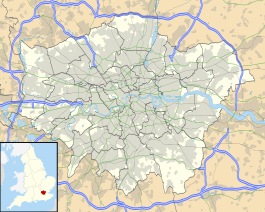Dollis Hill is a London Underground station at Dollis Hill near to Willesden and Gladstone Park of the London Borough of Brent. It is on the Jubilee line, between Neasden and Willesden Green stations and is in Travelcard Zone 3.[6] Metropolitan line trains pass through the station without stopping here.
| Dollis Hill | |
|---|---|
 platform | |
| Location | Dollis Hill |
| Local authority | London Borough of Brent |
| Managed by | London Underground |
| Number of platforms | 2 |
| Fare zone | 3 |
| London Underground annual entry and exit | |
| 2019 | |
| 2020 | |
| 2021 | |
| 2022 | |
| 2023 | |
| Railway companies | |
| Original company | Metropolitan Railway |
| Key dates | |
| 1 October 1909 | Opened as Dollis Hill |
| 1931 | Renamed Dollis Hill and Gladstone Park |
| 1933 | Renamed Dollis Hill |
| 20 November 1939 | Bakerloo line service introduced |
| 7 December 1940 | Metropolitan line service ceased |
| 1 May 1979 | Bakerloo line service replaced by Jubilee line |
| Other information | |
| External links | |
| Coordinates | 51°33′07″N 0°14′19″W / 51.55194°N 0.23861°W |
Gallery
edit-
Dollis Hill Station (1909) platform
-
Dollis Hill Station (1933) - Chapter Road entrance
-
One set of the enamel panels in the subway designed by Amanda Duncan
-
Dollis hill stn recent- platform
History
editThe station opened on 1 October 1909 as part of the Metropolitan Railway.[7]
The current art deco style platform buildings were built in 1938, and were designed by architect Stanley Heaps[8]
From 20 November 1939 it was on the Stanmore branch of the Bakerloo line and was transferred to the Jubilee line in 1979. It has two exits, north to Chapter Road and south to Burnley Road.
In 1995 four sets of enamel panels designed by Amanda Duncan were installed in the subway between the north and south exits. The panels show maps of the Dollis Hill area at different dates from the 16th to the 20th century, juxtaposed with interpretations of classical star maps.
The station was refurbished in 2007 with the addition of new lighting, tiling and additional security cameras. The station was also repainted.
Services and connections
editTrain frequencies vary throughout the day but generally operate every 3–6 minutes between 05:56 and 00:30 in both directions.[9][10]
London Bus routes 6, 52, 98, 226, 260, 266, 297, 302 and 460, and night route N98 serve the station.[11] Furthermore, routes 6, 52, 266 and 297 are 24-hour services.[11]
References
edit- ^ "Station Usage Data" (XLSX). Usage Statistics for London Stations, 2019. Transport for London. 23 September 2020. Archived from the original on 9 November 2020. Retrieved 9 November 2020.
- ^ "Station Usage Data" (XLSX). Usage Statistics for London Stations, 2020. Transport for London. 16 April 2021. Retrieved 1 January 2022.
- ^ "Station Usage Data" (XLSX). Usage Statistics for London Stations, 2021. Transport for London. 12 July 2022. Retrieved 7 September 2022.
- ^ "Station Usage Data" (XLSX). Usage Statistics for London Stations, 2022. Transport for London. 4 October 2023. Retrieved 10 October 2023.
- ^ "Station Usage Data" (XLSX). Usage Statistics for London Stations, 2023. Transport for London. 8 August 2024. Retrieved 16 September 2024.
- ^ Standard Tube Map (PDF) (Map). Not to scale. Transport for London. April 2024. Archived (PDF) from the original on 28 May 2024. Retrieved 3 June 2024.
- ^ "Willesden: Settlement and growth | British History Online".
- ^ "Dollis Hill Station".
- ^ "Jubilee line timetable: From Dollis Hill Underground Station to Neasden Underground Station". Transport for London. Retrieved 6 March 2015.
- ^ "Jubilee line timetable: From Dollis Hill Underground Station to Willesden Green Underground Station". Transport for London. Retrieved 6 March 2015.
- ^ a b "Buses from Willesden and Dollis Hill" (PDF). Transport for London. November 2014. Retrieved 6 March 2015.
| Preceding station | London Underground | Following station | ||
|---|---|---|---|---|
| Neasden towards Stanmore
|
Jubilee line | Willesden Green towards Stratford
| ||
| Former services | ||||
| Preceding station | London Underground | Following station | ||
| Neasden towards Stanmore
|
Metropolitan line Stanmore branch (1932–1939)
|
Willesden Green towards Baker Street or Aldgate
| ||
| Bakerloo line Stanmore branch (1939–1979)
|
Willesden Green towards Elephant & Castle
| |||
